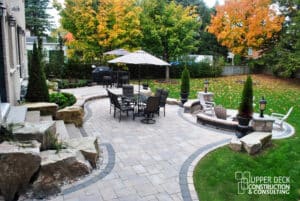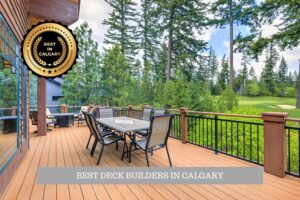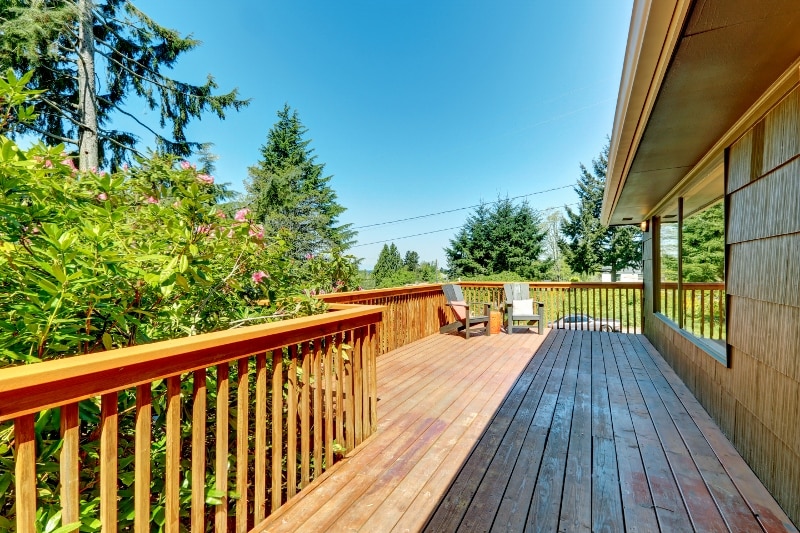
A deck addition is a great investment and it has a good return. Outdoor living spaces are sought after, which can give you a competitive edge if you ever want to sell your house. A deck addition can increase functional outdoor living space, creating a place for spending time with family and friends.
In most cases, building a deck requires a permit. Building codes and regulations will vary slightly from city to city, but it’s likely that obtaining a permit for your construction project is necessary. For example, decks that are higher than 2 feet above grade will require a building permit. The first thing you should do, before hiring deck contractors or attempting a DIY deck-building weekend, is check with your local municipality and find out what is required.
Table of Contents
ToggleWhat if I don’t get a deck permit?
If you don’t get a deck permit, you could run into some trouble down the road. In some jurisdictions, you could be dinged with a fine. The consequences might be tearing down the deck and building a new one.
If you hire a deck contractor and they don’t obtain a permit, there is no way of knowing if they built compliant to building code. Building code exists to ensure structures are built properly and safely. Whether you did it yourself or a hired a company, building outside of code regulations could make your deck hazardous. Without a permit there is no guarantee that the work is quality or that the deck is safe. Someone could get seriously injured. In some cases, a contractor that builds without a permit can be penalized.
Finally, having construction work that is not permitted can be a major obstacle when you decide to sell your house. You might have to get a retroactive permit, which can be a costly and inconvenient endeavor. Or, you might have to sell your house for much less than its worth. Home buyers are wary of unpermitted home improvements. As they should be.
If you do not disclose that there is unpermitted work when trying to sell a house, you can be asking for legal trouble if/when the buyer finds out. You can disclose that you didn’t get a deck permit and try to sell the house as-is, but this will not be in your favour. Buyers might assume that since you didn’t get a deck permit, there might be other unpermitted work lurking in the house. Examples would be plumbing, electrical or structural changes to the home.
Don’t chance it – get a deck permit.
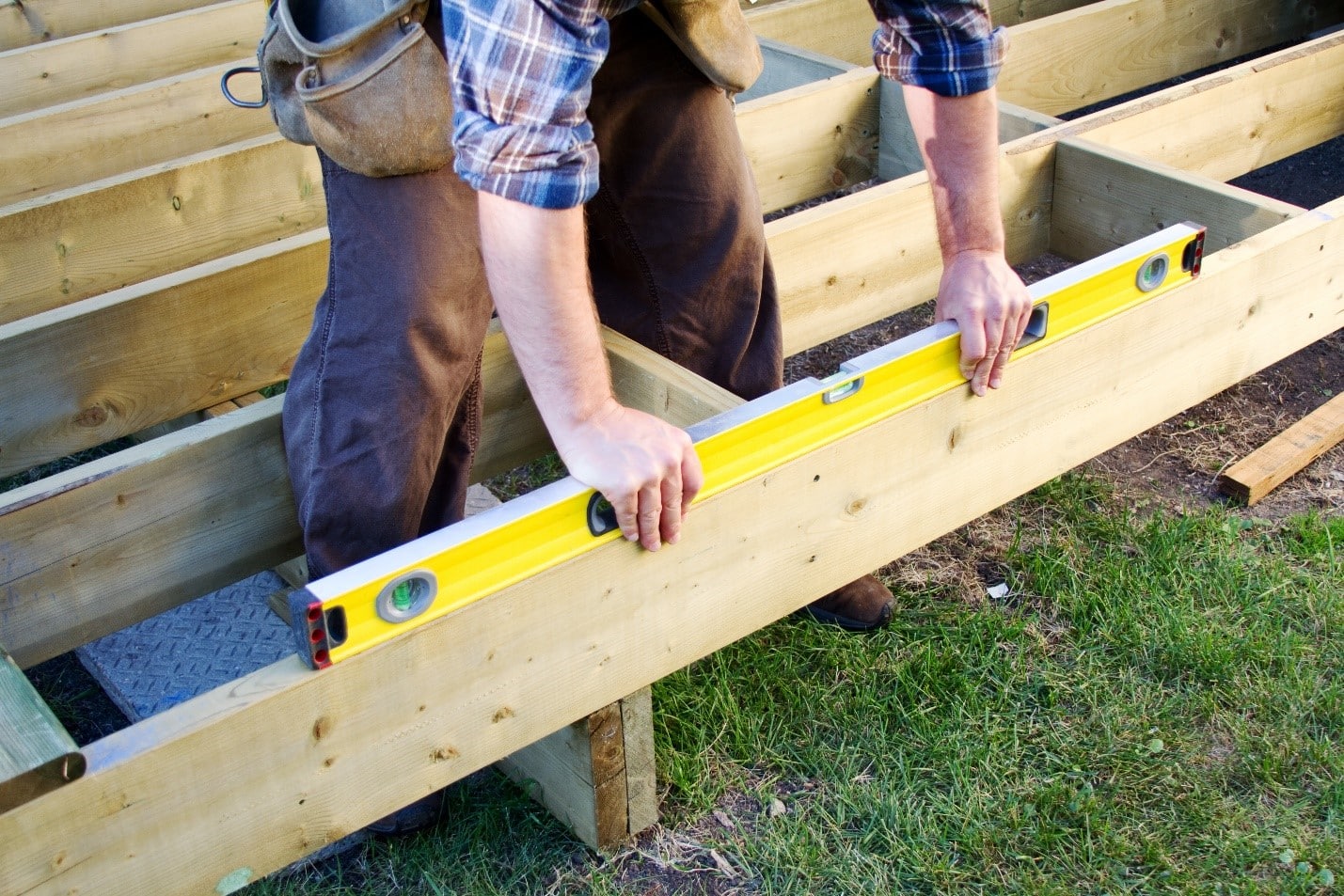
The best option before any deck addition project is to get a building permit. If you hire deck contractors, they will likely take care of this for you, but it doesn’t hurt to ask them. Inspectors from your local jurisdiction will likely be helpful and provide all the information you’ll need to apply for the permit.
While the details of what is required might vary from city to city, most require a permit if the deck is 24 inches above grade. When they are less than 24 inches high, the code varies more from place to place. Different requirements might exist depending on whether the deck is attached to the house or not and whether it serves as an exit point from an entry door.
What is required to get a deck permit?
In most cities, to get a permit you need to supply one or two copies of a to-scale drawings of the deck plan. Usually the overhead view is required, but sometimes they’ll need a drawing of the elevation from the side or front of the structure.
When you hire a deck builder, they’ll have computer software that can create these drawings for you. Not only is this handy for obtaining a permit, it will also give you a great idea of how your new deck will look in your yard in relation to your house and other structures.
The plan you submit will have to include locations, sizes of your frost footings, spacing, beams, joists and so on. The inspectors, or the people going over your plans to provide the permit, will have to make sure the deck plan will meet local structural building code requirements. Sometimes they’ll need information regarding the railings, stairs, ledger board and other structural components of the deck so they can ensure it’s safe. The materials used, including decking, rails and hardware will also be submitted in your plan.
You have the plan; now how do you apply for the deck permit?
Again, if you hire professional deck builders, they can take care of all this for you. If you’re doing it yourself, or your deck builder doesn’t offer this service, applying for the deck permit is not difficult. First you must find out who issues permits. Usually it’s the city or county office. Most places will have their own building code or inspection department. If you’re not sure, start researching permits in your city and something will come up online.
Once you’ve reached the right department or website, you should be able to find a list of what is required and general instructions on how to apply for the permit. Some might have a downloadable form on their website for the application itself that is to be submitted with the required drawings.
These instructions will include specific zoning requirements. For example, your deck must not be within a certain distance from property lines or utility lines. You should get your local utility providers to come and mark their lines in your yard. This way you can be sure on where your deck will have to go, and you won’t have to worry about hitting any power, water, cable or gas lines. This will all be included in your deck building plan.
Sometimes your plan for your dream deck will have to be revised due to unforeseen space issues. For example, your city might have zoning bylaws about decks facing the street or on a corner lot. Your deck might have to be a certain distance from the street or there might be rules around where your entry doors are location. Likewise, there might be aesthetic requirements or regulations regarding the quality and value of the deck and how it relates to the neighbourhood. This is all information you’ll get from the government office.
How much does a deck permit cost?
Deck permit fees will differ from place to place. Some cities might require a fee for multiple permits including a development permit, building permit, safe code and processing fee. Others will have a fee for every $1,000 of perceived worth of the construction project. You could pay more or less depending on the estimated value of the construction project and the type of deck. For example, a covered deck might have higher permit fees compared to an uncovered deck.
Examples of building permit fees in Canadian cities:
Vancouver: Total fee for a deck is determined by the cost/value of the construction project, with an application fee on top of that. Permits for projects $5,001 to $250,000 will cost $130 plus $12.70 for each $1,000 or part thereof over $5,001. For projects under $5000, the cost for the permit is $130.
Edmonton: Total fee for an uncovered deck, including development permit, building permit and safety code fee is $228.50.
Regina: Permit fees for deck construction or addition is $8 for every $1,000 value at a $100 minimum charge.
Winnipeg: Total fee for a deck addition is $125 including the building and development permit fee. There is a non-compliant charge of $366.
Toronto: The fee for a residential deck building permit is $198.59. The same fee applies to porches and carports.
Montreal: Each individual borough of Montreal is responsible for issuing permits. For more information, visit the official city portal.
Fredericton: Building permit fee, including decks, is $8 per $1,000 value of the construction project. The construction value is rounded up to the next thousand to make the calculation.
Halifax: The permit fee is $5.50 per $1000 of estimated value of the project. The minimum fee is $25.00 plus a development fee of $25.00.
St. Johns: The permit fee is $9 per $1,000 of estimated value of construction with a minimum fee of $50.
The value of a deck addition.
Outdoor living spaces can bring up property value. Most Canadians like the idea of spending more time outdoors, in the comfort of their own property. A deck addition will create a space for dining, entertaining, socializing and relaxing. It becomes an additional, functional and attractive living space.
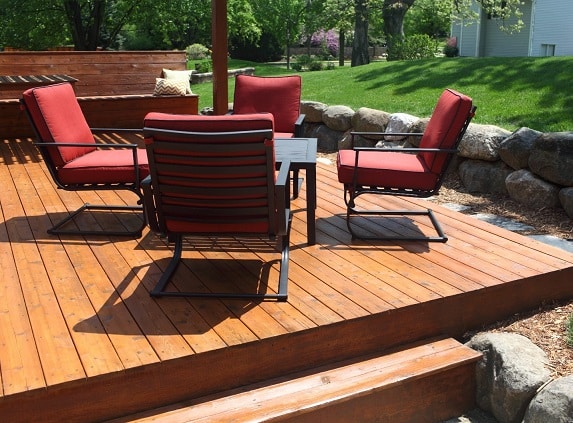
Value of wood decks vs. composite decks.
Wood decks: According to this report, a wood deck addition can recover 75.6 percent of it’s cost at resale. So, if a homeowner spends $13,000 building a new deck, they can expect over $10,000 of that to be added to the value of their property. This deck example was 16×20 feet, built with pressure-treated joists supported by 4×4 posts that are anchored to concrete pilings. The deck surface is pressure-treated deck boards with a built-in planter and bench using the same type of wood. The deck included stairs, railings and balusters.
Keep in mind that a DIY deck would cost a fraction of this with a similar structure. That means your return on investment could potentially be much higher than 75.6 percent. You should also consider other costs that will determine your deck’s RIO. These things could include the types of homes and decks in the neighbourhood, the material used, size of the deck, it’s aesthetics and how it compliments both the house and the rest of the property.
Composite decks: Composite is another common deck material. It’s popular for good reason and has a fair return on investment. Composite is more expensive than wood, but due to its minimal maintenance requirements and longevity, could pay for itself over the years.
The same cost vs. value report stated that composite deck additions can recoup 69.1 percent of their cost at resale. The return is lower and the cost itself is higher. Using this statistic, you could spend over $19,000 on a composite deck with a $13,000 return. The composite deck in this example was the same dimensions and had the same building features as the wood deck mentioned above.
Other decking material options include cedar wood decking, vinyl decking and railing options including wood, glass and composite railings.
Should I hire a deck builder or DIY?
Just like any home renovation, there are always pros and cons to both options: DIY or hiring a professional?
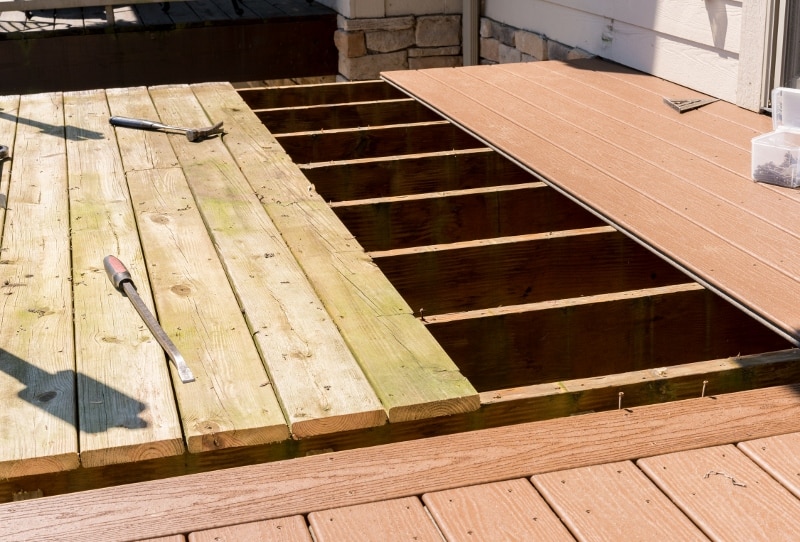
When you hire a professional deck builder, you will have everything taken care of for you. This is a huge pro for a lot of homeowners. Deck builders can help create your deck design, go through the hassle of applying for permits and take care of construction. They will be able to do it faster than you, and it many cases, more effectively. Because they have experience, knowledge and the right tools, an experienced deck contractor can get a safe, building-code-compliant deck up in a fraction of the time compared to a DIYer.
When you hire a pro, you won’t have to worry about purchasing and hauling materials to your yard. A deck builder will come fully equipped, so you won’t have to worry about getting better tools. And, you won’t make multiple trips to the hardware store for missing hardware and materials. They can also give you price options for different decking materials. This takes out the guess work and allowing you to create a detailed budget for your project.
Tips for saving money on your deck construction:
If you want to attempt to DIY, but need help with the design and permit plans, often contractors will offer that service. They can give your deck a unique design, ensure it fits well in your yard and prepare the right drawings required to obtain the permit. This can take a lot of headache out of a major DIY project.
Another cost-saving compromise is to find a deck builder that will allow you to purchase some of the materials or do some of the work yourself. This way you can wait until lumber goes on sale, then have a professional build it for you. You can also ask if they could do the planning and framing but leave the decking to you. Laying decking is not difficult, but it can be time consuming. Handling this part of the job on a Saturday could save you a fair amount in labour costs.
If you’d rather save yourself the time and gain peace of mind knowing it’s done right, hire an experienced and reputable deck builder in your city. You’ll enjoy summer out on your new deck, knowing that you’ve done the paperwork and gone through the steps to build it properly and to your local building. code.

Copy Below To Share this Infographic On Your Site
Find a RenovationFind Certified deck builder in your city!
| Alberta | British Columbia | Saskatchewan |
| Edmonton Deck Builders | Kelowna Deck Builders | Regina Deck Builders |
| Calgary Deck Builders | Vancouver Deck Builders | Saskatoon Deck Builders |
| Victoria Deck Builders | ||
| Manitoba | Nova Scotia | Newfoundland |
| Winnipeg Deck Builders | Halifax Deck Builders | St. John’s Deck Builders |
| Ontario | Quebec | New Brunswick |
| Toronto Deck Builders | Montreal Deck Builders | Fredericton Deck Builders |
| Barrie Deck Builders | Quebec City Deck Builders | Moncton Deck Builders |
| Hamilton Deck Builders | Saint John Deck Builders | |
| Kitchener Deck Builders | ||
| London Deck Builders | ||

